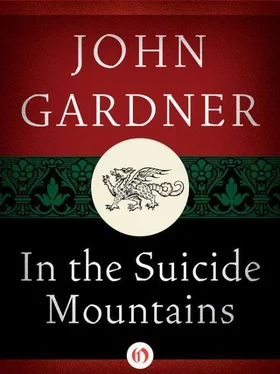He grew more animated. The room was in absolute darkness now, the fire in the hearth had died completely, but Armida could hear the abbot pacing, hurrying back and forth, occasionally bumping into the little table. He continued: “We human beings glimpse lofty ideals, catch ourselves betraying them, and sink to suicidal despair — despair from which only the love of our friends can save us, since friends see in us those nobler qualities we ourselves, out of long familiarity, have forgotten we possess. That, of course, is why the suicidal person is so difficult around his friends. I know all about these things, believe me. I don’t live here at Suicide Leap for nothing! ‘Get rid of all friends,’ thinks the poor mad suicidal, ‘and the end becomes a possibility.’ So he insults his friends, teaches himself to hate them; yet even then secretly he hopes they will save him; even then he reaches out, bawls for new friends! Ah, these contradictions! Fiends are legion, we discover; our noblest hopes grow teeth and pursue us like tigers! Well, never mind; to be human is, inevitably, to hate oneself sometimes, to hunger for the perfect stability and in a way the perfect justice — or at least perfect punishment for our numerous imperfections — called death. What was I talking about? Ah! Yesss, the dragon. Old Koog.”
He stopped pacing, stood perfectly still, lost in blackness. “A dragon, my dear prince, light of my life, has no such feelings as these I’ve just described. His existence is a malevolent joke on ours, a criticism, cosmically unfair. While the good man throws away his life to gain life, twists and strains and, with luck, transcends himself — by perilous battle achieves self-respect and the honest admiration of his neighbors and friends — and while the bad man with still a speck of decency throws away his for the love of that microscopic speck, the dragon flies out in the service of mad whim or sits at his ease for a thousand years on his useless emeralds and rubies, his gold cups and silver cups, and scornfully laughs! Does that really not disturb you, Prince Christopher? Do you feel no rage at all at a thing like that?”
After a moment Prince Christopher’s voice came from the darkness: “Perhaps I should sleep on it.”
“Yes, certainly,” said the abbot. Quite suddenly, he showed his age: his voice was pure exhaustion. “Forgive me, I’ve kept all of you up too long.” Without another word, he went to a door and threw it open. Feeble light crept in. “This way,” said the abbot. The prince put down his brandy glass and came over to touch Armida’s shoulder. She pretended to awaken, though in fact, of course, she’d been spying intently all the while. She sat up, flapped her lashes once or twice, then rose. The abbot stood waiting, hands in his cassock. Armida went to waken the dwarf. When her fingertips touched him, Chudu the Goat’s Son gave a start and hurriedly turned himself into a book; then, fully awake, turned back into himself. “I dozed off,” he said.
“It’s time for bed,” said Armida, and took a step toward the abbot. Now the dwarf, too, was on his feet, limping toward the light. The abbot led them down flagstoned hallways and across a stretch of grass to the monks’ dormitory — there was a mumble of praying voices — and when they reached the place gave them three rooms. The dwarf said as Armida was about to close the door, “Did I miss anything?”
“I’m not sure,” said Armida.
Something in her voice made Chudu the Goat’s Son look harder at her face, but she was imitating her step-sister again, so there was nothing there to read.
“Good night,” she said, and closed the door.
The dwarf moved on to his own room, the abbot standing in the dimness, watching with bright eyes. Yet his old face was drained, like a sick man’s. Chudu called at the prince’s door, “Good night, Prince.” Christopher the Sullen was already sound asleep, still in all his clothes. “Good night,” said Chudu to the abbot.
“Good night,” said the abbot feebly, with a suggestion of a bow. Then the saintly abbot turned and, breathing heavily, just perceptibly dragging one foot, went his way.
The following morning Prince Christopher the Sullen announced that he’d decided to fight the dragon. He spoke of going alone, but Armida wouldn’t hear of it, and since Armida insisted on going, the dwarf insisted that he, too, must go. The abbot ordered one of the monks to give Prince Christopher a map and said, “God bless you, my children.” Another monk was sent to bring up Boy. The horse, when he saw the prince sharpening his sword and battle ax and putting an extra fine point on his lance, was extremely uneasy, but he said nothing. He considered not allowing the prince to mount, and he was downright cross when he discovered that today he was expected to carry Armida and the Goat’s Son too; but it was a pretty day, with birds singing everywhere, and except for a stamp of his right front hoof he made no protest.
Armida, leaning toward the prince’s shoulder, said: “Did you bring your violin?”
“I always take my violin,” said the prince, twisting around in the saddle to look at her. “Why?”
“No reason,” said Armida, and smiled so stupidly that both Chudu and the prince felt vaguely suspicious. They kept their thoughts to themselves, however; the prince heaved a deep sigh, and poked the horse’s side, very lightly, with his spurs.
Speedily a tale is spun; with much less speed a deed is done. When they had crossed the first mountain, and then a second and a third, they came to a wide green valley surrounded by forest, and at the end of the valley, set among wildflowers and bones, they beheld a cave. There was a stink far greater than Chudu’s in the air, and though there were birds in every tree they were all of them as silent as fieldstones. The horse knew the cave of a dragon when he saw one, and he turned his head around and looked mournfully at the prince and wept a tear.
“Well, this looks like the place,” said the prince, and bit his lips.
Armida and the dwarf dismounted, and the prince sat awhile more, biting his lips and sighing. Armida stood combing her long yellow hair, her pale wrist so limp it was a wonder she could manage to pull the comb. “Have you a plan?” she asked casually.
“Not really,” said the prince. “I suppose when I get there something will come to me.”
Armida glanced at him, pursed her lips, and went on combing. “How do you feel?” she asked.
“Oh—” the prince began thoughtfully. But he changed his mind and said no more.
Chudu the Goat’s Son puffed at his pipe and batted his fists together nervously. He hadn’t quite realized how much he liked Prince Christopher, and how sorry he would be when he was dead. He began to feel cross, and then downright angry, at the world in general. Against his carefully nurtured better nature he began to feel an impulse to destroy things — blast trees out of the ground, make the earth open up, or maybe stomp on his hat; but he controlled himself — as he always did, or almost always, when these dark urges came: he started counting. By the time he reached seven hundred thousand — he was counting very fast — he was mad as a hornet. If it were possible for a dwarf to kill a dragon he’d have done so on the spot; but dwarfs are impotent against dragons, no one knows why.
“Well,” said the prince, and heaved another deep sigh, “I suppose I’d better get it over with.”
“Good bye, Prince Christopher,” said the dwarf, and he took his hat off and held it to his chest.
Armida burst out crying.
“Don’t cry, Armida,” said the prince gently. “It’s not as bad as you think. I’ll tell you something. It feels sort of good, to tell the truth. I would have said it was sentimental foolishness, but it feels really fine to be battling a dragon, with a beautiful maiden looking on. No fooling. It’s the kind of thing a prince ought to do. Violin playing’s all very well, and poetry, but I am a prince, after all, you know? I may not be very clever or very strong, but my heart at least is manly. I’m glad to have found that out.”
Читать дальше












